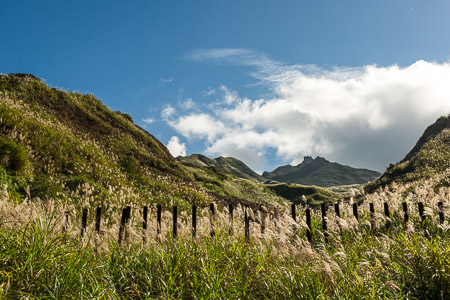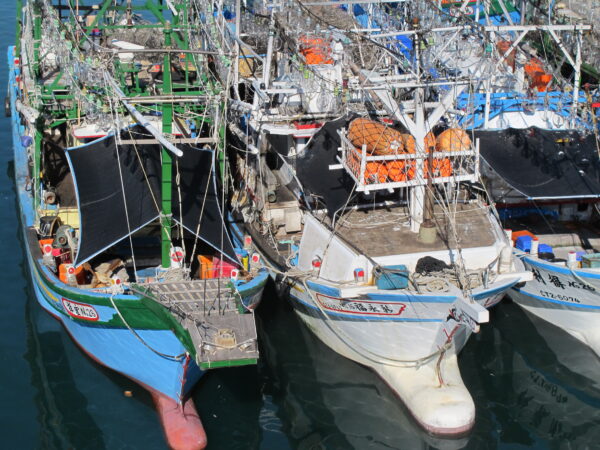Day-Trip Destinations Around Taipei

Like Shanghai, Tamsui (sometimes spelled ‘Danshui’) was once a treaty port, meaning that in the second half of the 19th century traders and residents from the British Empire, France, Russia, and the United States enjoyed special rights and protections. The town lies on the northern side of a scenic estuary, and began developing after the Spanish built Fort San Domingo in the first half of the 17th century. That bastion was taken over and rebuilt from scratch by the Dutch East India Company (who established a major base at what’s now Tainan) before becoming an imperial Chinese barracks. The British government later rented the site and used it as their consulate until 1972. The fort is just one of several relics in Tamsui that history buffs will find fascinating.
North coast attractions
Jiufen and Jinguashi are just a few kilometres apart. From both, visitors can enjoy stirring views of the northeast coast’s bays and promontories. Both of these little towns owe their existence to the minerals contained in the steep hills hereabouts. Jiufen grew rapidly during the 1920s and 1930s while gold was extracted. At Jinguashi, copper was mined as well as gold. When the mines closed down in the 1980s, most residents moved out, leaving behind a number of traditional houses along narrow and incredibly quaint streets. Jinguashi’s New Taipei Gold Museum is an excellent place to learn about the area’s geology and history. One of the darkest episodes in its history occurred during World War II, when Allied prisoners-of-war were forced by the Japanese then occupying Taiwan to work in awful conditions in the town’s gold and copper mines. Jiufen is possibly the region’s most popular day-trip attraction, rivalled only by Yehliu Geopark.
Among the string of fishing villages that exist on the north and northeast coasts, perhaps the most interesting are Fuji (while you’re here consider walking to Fugui Cape and/or Laomei Green Reef) and Badouzi. The latter is near Keelung, a busy harbour city known to Taiwanese people mainly for Miaokou Night Market. Heping Island, a short bus ride from the centre of Keelung, has a few remnants of the Dutch and Spanish who based themselves here in the 17th century. Near Badouzi, the National Museum of Marine Science and Technology (NMMST) explores ocean sustainability, naval architecture, and other sea-related fields.
Badouzi is also the terminus of a short but fun branch railway. The Shen’ao Line leaves the main rail network at Ruifang (the launchpad for journeys along the Pingxi Branch Railway) and makes only one stop — at Haikeguan, near the NMMST — before hugging the coast for a few hundred metres. Just 4.6 km (2.9 miles) in length, this makes for a delightful distraction. If you’d rather not retrace your steps, consider taking a bus onto Fulong or into Keelung. Like Taiwan’s other branch railroads, the Shen’ao Line was built to serve industry not passengers, having been constructed in the 1960s to move coal to a now-defunct power station.
Recognising that the coral reefs near the southern tip of Taiwan are in great danger as the Earth and its oceans warm, ecologists are trying to ensure the survival of vulnerable coral species by proagating corals in cooler northern waters. At Wanghaixiang Chaojing Bay Resource Conservation Area, within walking distance of the NMMST, researchers backed by the charitable arm of one of Taiwan’s most forward-thinking electronics companies use LED lighting to accelerate the growth of corals before transplanting them. At the bay, volunteers are kept busy removing unwanted algae and monitoring the corals’ health.
Mountains to the north, mountains to the south
Far from the sea, and sprawling over a greater area than that of Taipei City, Wulai is a mountainous indigenous district with fewer than 6,400 human residents, but substantial and fascinating animal and bird populations. For tourists whose plans include lounging in luxurious hot springs, birdwatching, hiking, or sampling the distinctive cuisine of Taiwan’s Austronesian minority, Wulai is the place to go.
Covering the mountains northwest of Taipei — and accessible by a number of bus routes — Yangmingshan National Park has indoor and outdoor hot springs plus several well-marked yet challenging hiking routes. During the autumn this splendid nature reserve attracts fans of silver grass, dense clusters of which sway, undulate, and rustle to create a moving picture as pleasing as any presented by the ocean.
If you’d like to visit all of these places but navigating public transport sounds daunting, contact us today to arrange a bilingual driver-guide who’ll not only pick you up from your hotel but also ensure you’ll have a seamlessly enjoyable experience. Each Life of Taiwan private tour is tailor-made to match your interests and meet your expectations.

